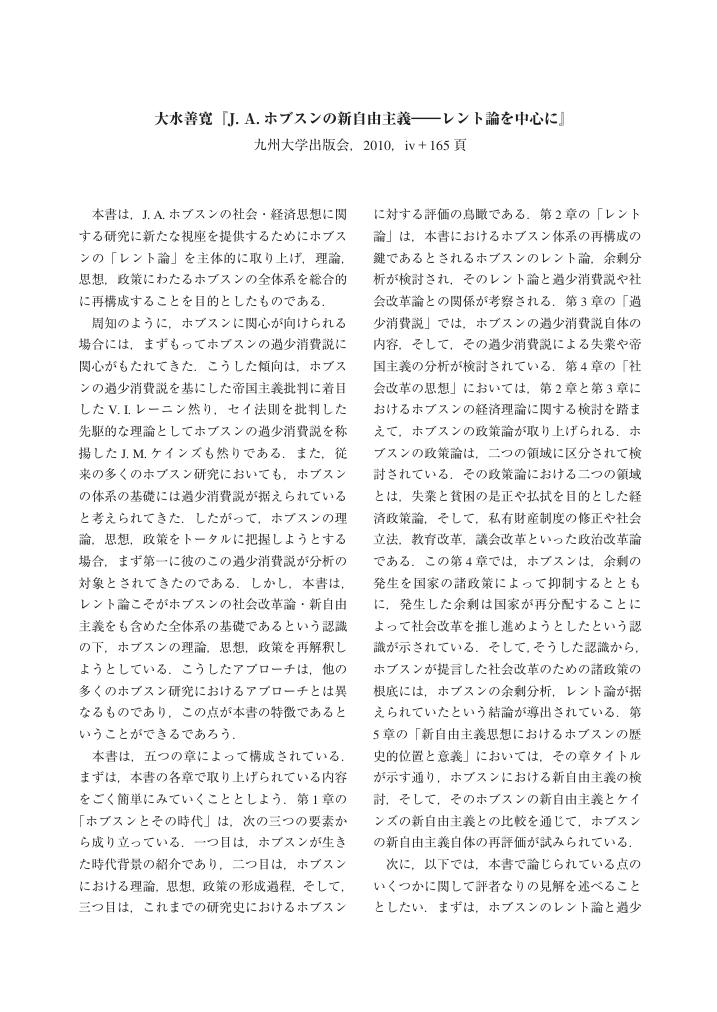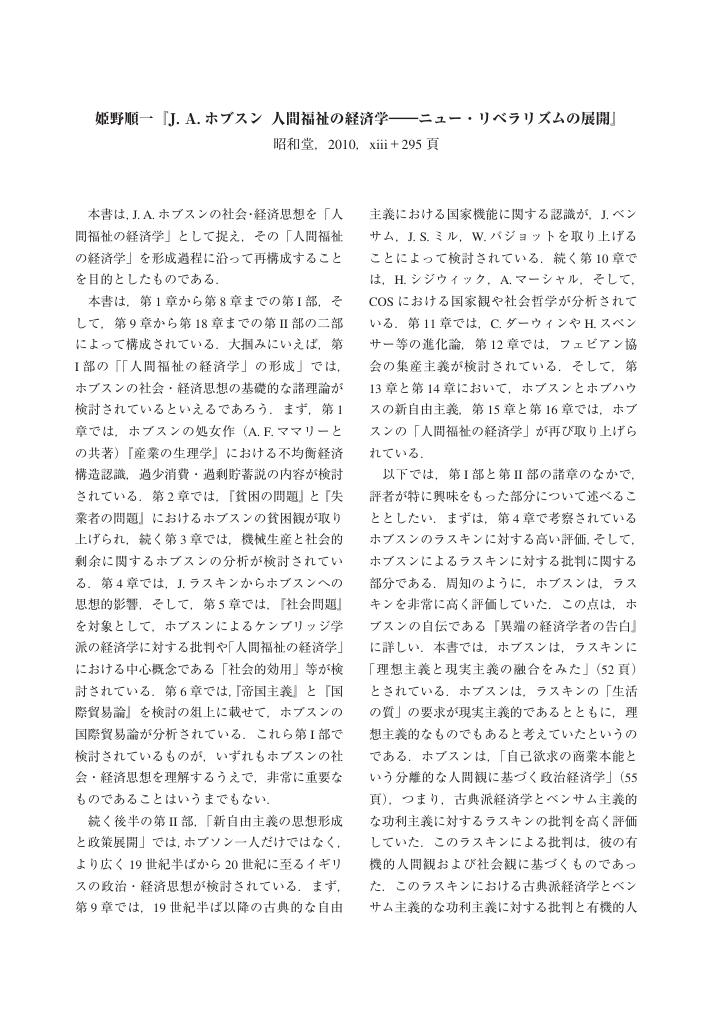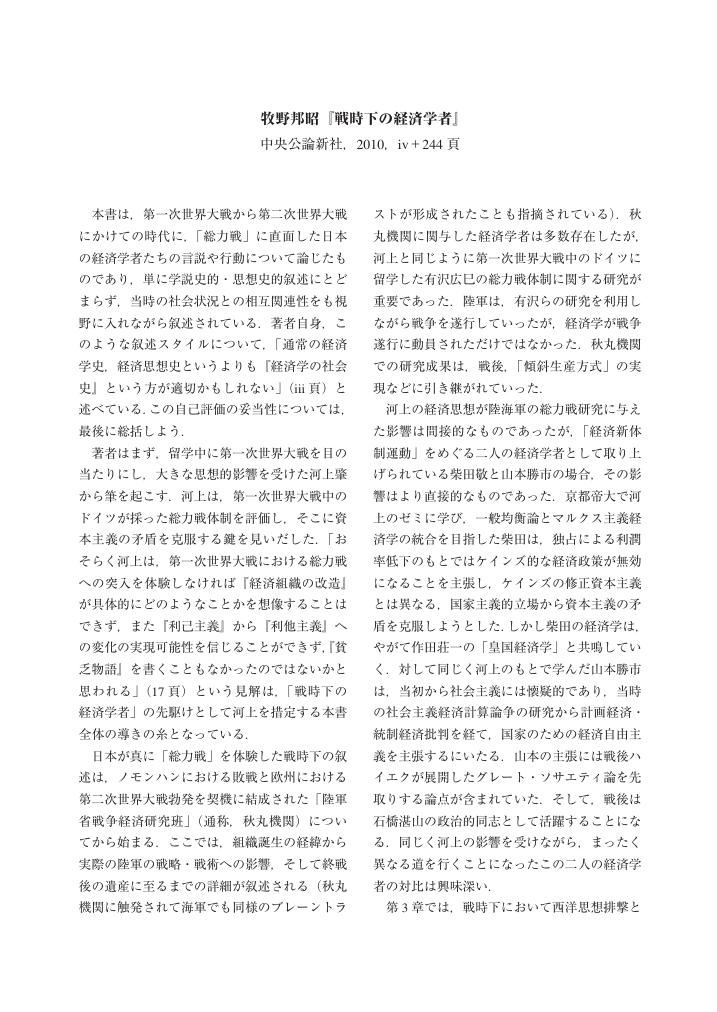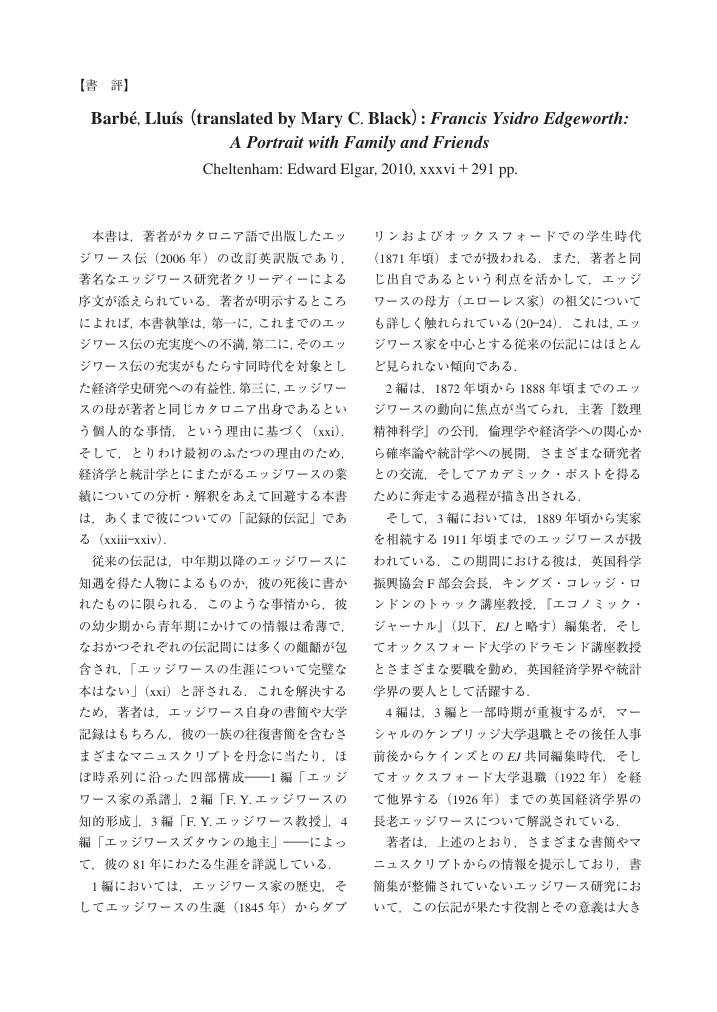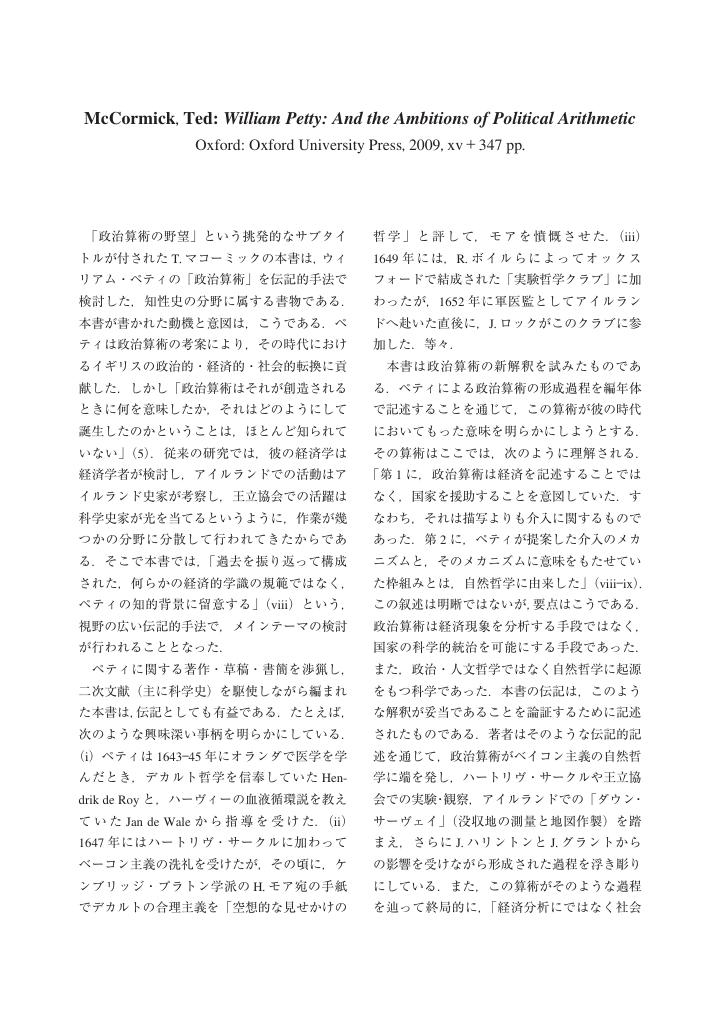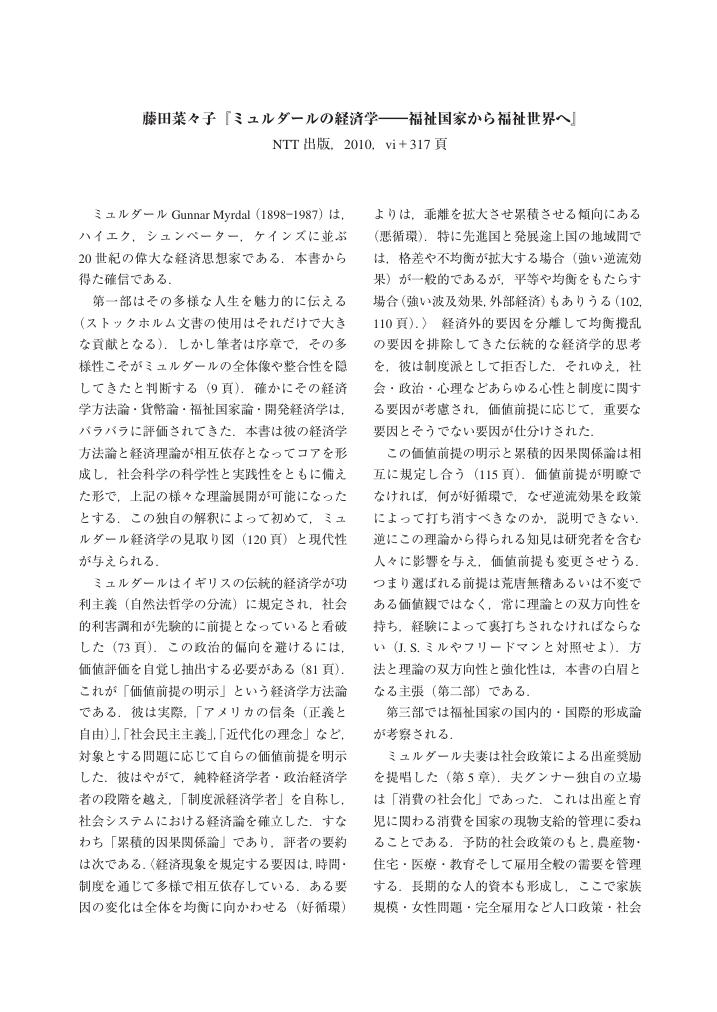- 著者
- 八田 幸二
- 出版者
- 経済学史学会
- 雑誌
- 経済学史研究 (ISSN:18803164)
- 巻号頁・発行日
- vol.53, no.1, pp.131-133, 2011 (Released:2019-10-30)
1 0 0 0 OA 小林 純『ヴェーバー経済社会学への接近』日本経済評論社, 2010年, xi+278頁
- 著者
- 古川 順一
- 出版者
- 経済学史学会
- 雑誌
- 経済学史研究 (ISSN:18803164)
- 巻号頁・発行日
- vol.53, no.1, pp.134-135, 2011 (Released:2019-10-30)
- 著者
- 原谷 直樹
- 出版者
- 経済学史学会
- 雑誌
- 経済学史研究 (ISSN:18803164)
- 巻号頁・発行日
- vol.53, no.1, pp.136-137, 2011 (Released:2019-10-30)
- 著者
- 八田 幸二
- 出版者
- 経済学史学会
- 雑誌
- 経済学史研究 (ISSN:18803164)
- 巻号頁・発行日
- vol.53, no.1, pp.138-140, 2011 (Released:2019-10-30)
1 0 0 0 OA 牧野邦昭『戦時下の経済学者』中央公論新社, 2010年, iv+244頁
- 著者
- 中村 宗悦
- 出版者
- 経済学史学会
- 雑誌
- 経済学史研究 (ISSN:18803164)
- 巻号頁・発行日
- vol.53, no.1, pp.141-142, 2011 (Released:2019-10-30)
1 0 0 0 OA On David Ricardo's Theory of Profits:
- 著者
- Heinz D. Kurz
- 出版者
- The Japanease Society for the History of Economic Thought
- 雑誌
- 経済学史研究 (ISSN:18803164)
- 巻号頁・発行日
- vol.53, no.1, pp.1-20, 2011 (Released:2019-08-21)
- 被引用文献数
- 3 6
Abstract: The paper grew out of discussions with Japanese colleagues about Ricardo’s theory of profits on the occasion of a meeting at Meiji University in September 2009. It is argued that from an early time onwards Ricardo was convinced that the rate of prof- its could be ascertained in purely physical terms, without any question of valuation. Unfortunately, he was not given the time to translate this vision into a coherent and general theory. However, the vision permeates all his consecutive attempts at formu- lating such a theory-from the early ‘corn-ratio theory’ via the Essay on Profits to the Principles. The theory was meant to be general, taking into account all industries of the economy and paying due attention to their relationships. Ricardo understood that when it comes to the determination of the rate of profits, only those industries matter, which directly or indirectly contribute to the production of ‘necessaries,’ or wage goods, whereas industries that produce ‘luxuries’ do not. The concept of ‘corn,’ a com- posite commodity, was designed to reflect the set of industries producing necessaries. The surplus of necessaries over the amounts of them employed in production as capi- tal gives the rate of profits as a physical ratio. Ricardo’s ‘fundamental law of distribu- tion’ expresses the inverse relationship between the general rate of profits, conceived in this way, and real wages. It was Piero Sraffa who finally managed to elaborate a coherent and comprehensive theory of profits that confirmed Ricardo’s vision that the laws of distribution are ‘not essentially connected with the doctrine of value’ and overcame the shortcomings of Ricardo’s analysis. JEL classification numbers: B 24, D 33, D 51.
1 0 0 0 OA デフォーと合邦のレトリック 1707年合邦と「見えざる手」
- 著者
- 林 直樹
- 出版者
- 経済学史学会
- 雑誌
- 経済学史研究 (ISSN:18803164)
- 巻号頁・発行日
- vol.53, no.1, pp.44-63, 2011 (Released:2019-08-21)
This paper aims to grasp the political and socio-economic background of the Union of 1707 and the characteristics of Daniel Defoeʼs social thought through an examination of his major historical work, The History of the Union of Great Britain (1709). On the eve of the Union, Defoe served as an English spy among Scottish people and wit-nessed a surge of their anti-English passions firsthand. The works by Andrew Fletcher of Saltoun, the most influential contemporary Scot-tish republican writer, embodied these antipa-thies in a very sophisticated manner. Defoe paid close attention to both the republican thought and its vocabulary typically expressed in Fletch-erʼs texts and managed to combine them with the rhetoric of divine providence. This was an intel-lectual activity for the creation of a historical narrative in which the distressed Scottish people could finally find relief. Defoeʼs History of the Union asserted that the conflicts between England and Scotland had been transmuted into peacemaking factors by the leading of providence. Some contemporary affairs were considered as examples: the founda-tion of the Company of Scotland Trading to Af-rica and the Indies, Massacre of Glencoe, Act of Settlement in England, Act of Security in Scot-land, Alien Act in England, and execution of Captain Green after seizing of the ship Worces-ter in Scotland. While recounting these affairs, the present paper focuses on the nature of the rhetoric to which Defoe appeals. His appeal to “an Invisible Hand” represents a concealing design, that is, to appease the complex feelings held by those liv-ing in North Britain. His History of the Union seems to have been written to persuade them rather than to preserve historical facts them-selves. JEL classification numbers: B 11, B 31, N 40.
1 0 0 0 OA J. プリーストリーの奴隷制批判 ダーウィン,スミスとの比較
- 著者
- 松本 哲人
- 出版者
- 経済学史学会
- 雑誌
- 経済学史研究 (ISSN:18803164)
- 巻号頁・発行日
- vol.53, no.1, pp.64-81, 2011 (Released:2019-08-21)
This paper aims to discuss Joseph Priestleyʼs ar-gument regarding antislavery and compare his contention with those of Erasmus Darwin and Adam Smith. Eighteenth-century England wit-nessed numerous arguments over antislavery. Joseph Priestley, known as a prolific writer, also wrote a remarkable book on antislavery, A Sermon of the Slave Trade (1788), hereafter SST The book, however, has not gained promi-nence. Priestleyʼs argument regarding antislavery also featured in his Lectures on History and General Policy (1788, hereafter LH). He gave lectures on history, language and grammar, and law and politics at the Warrington Academy from 1761 to 1767 and organized and published them later. In the book, Priestley divided his dis-cussions on slavery on the basis of two aspects, humanitarian and economic, and discussed them briefly. Priestley discussed slavery in great detail in SST. The humanitarian discussions were previously conducted by Darwin. He appealed to the benevolence implanted in human nature. Al-though Priestley did not directly refer to Darwin, their arguments were rather similar. With regard to the economic discussions, Priestley said that he read Smithʼs Wealth of Nations (1776), wherein he discovered certain general principles illustrated by Smith. Priestley learned considera-bly from Smith and was inspired by him. More-over, Priestleyʼs antislavery debates were influ-enced by Smithʼs arguments. Both the humanitarian and economic charac-teristics of Priestleyʼs argument coexisted in his books, whether LH or SST. Therefore, Priestley considered not only the economic aspects dis-cussed by Smith but also the humanitarian (or ethical) aspects, which continued to feature in the mainstream after Hutcheson advocated them. Smith had not discussed the latter aspect. JEL classification numbers: B 12, B 31.
1 0 0 0 OA デュガルド・スチュアートの救貧思想と貧困対策 スミス以後の貧困問題を中心に
- 著者
- 荒井 智行
- 出版者
- 経済学史学会
- 雑誌
- 経済学史研究 (ISSN:18803164)
- 巻号頁・発行日
- vol.53, no.1, pp.82-99, 2011 (Released:2019-08-21)
This paper aims to clarify Dugald Stewartʼs view on poverty. He has generally been considered an optimist and admirer of the development of commercial society and unlimited free trade. However, notably, Stewart emphasized the im-portance of poor relief in his influential Lectures on Political Economy (1800―1810). I will show the significance of his view on the establishment of public granaries related to the Scottish poor relief system, which, historically, had had an enormous effect on the maintenance of the poor. However, Stewart recognized that the Scot-tish poor relief system would augment financial burdens through the annual increase of poor rates. In this paper, I attempt to explain the sig-nificance of Stewartʼs realistic view of the evils of charitable workhouses, factory labor, and so on, focusing mainly on his criticism of poor laws as leading to an increase in poverty. Moreover, I shall highlight the important fact that Stewart indeed proposed various forms of poor relief. The basic components of his poor relief policies can be summarized as follows: (1) possession of property among the lower classes, (2) im-provements in the prison system, and (3) gradu-al advancement of low wages. The first relates to the improvement of morals and the incentive to work; the second, the prevention and correc-tion of crimes; and the third, the improvement of their living conditions through economic devel-opment. Focusing on his arguments on these poor re-lief policies, I will illuminate the historical sig-nificance of Stewartʼs original view of poor re-lief in the early nineteenth century after Smith. JEL classification numbers: B 30, B 31, I 31.
- 著者
- 上宮 智之
- 出版者
- 経済学史学会
- 雑誌
- 経済学史研究 (ISSN:18803164)
- 巻号頁・発行日
- vol.53, no.1, pp.119-120, 2011 (Released:2019-10-30)
- 著者
- 尾近 裕幸
- 出版者
- 経済学史学会
- 雑誌
- 経済学史研究 (ISSN:18803164)
- 巻号頁・発行日
- vol.53, no.1, pp.121-122, 2011 (Released:2019-10-30)
- 著者
- 大倉 正雄
- 出版者
- 経済学史学会
- 雑誌
- 経済学史研究 (ISSN:18803164)
- 巻号頁・発行日
- vol.53, no.1, pp.123-124, 2011 (Released:2019-10-30)
- 著者
- 若田部 昌澄
- 出版者
- 経済学史学会
- 雑誌
- 経済学史研究 (ISSN:18803164)
- 巻号頁・発行日
- vol.52, no.2, pp.147-148, 2011 (Released:2019-10-28)
- 参考文献数
- 3
1 0 0 0 OA 塩野谷祐一『経済哲学原理――解釈学的接近』東京大学出版会, 2009年, ix+445頁
- 著者
- 有江 大介
- 出版者
- 経済学史学会
- 雑誌
- 経済学史研究 (ISSN:18803164)
- 巻号頁・発行日
- vol.52, no.2, pp.149-150, 2011 (Released:2019-10-28)
1 0 0 0 OA 鈴木信雄『内田義彦論』日本経済評論社, 2009年, iv+248頁
- 著者
- 野沢 敏治
- 出版者
- 経済学史学会
- 雑誌
- 経済学史研究 (ISSN:18803164)
- 巻号頁・発行日
- vol.52, no.2, pp.151-152, 2011 (Released:2019-10-28)
- 著者
- 篠原 久
- 出版者
- 経済学史学会
- 雑誌
- 経済学史研究 (ISSN:18803164)
- 巻号頁・発行日
- vol.52, no.2, pp.153-154, 2011 (Released:2019-10-28)
- 著者
- 小峯 敦
- 出版者
- 経済学史学会
- 雑誌
- 経済学史研究 (ISSN:18803164)
- 巻号頁・発行日
- vol.52, no.2, pp.155-156, 2011 (Released:2019-10-28)
- 参考文献数
- 2
- 著者
- 只腰 親和
- 出版者
- 経済学史学会
- 雑誌
- 経済学史研究 (ISSN:18803164)
- 巻号頁・発行日
- vol.52, no.2, pp.157-158, 2011 (Released:2019-10-28)
1 0 0 0 OA 村田和博『19 世紀イギリス経営思想史研究――C. バベッジ,J. モントゴメリー,A. ユア,およびJ. S. ミルの経営学説とその歴史的背景』五絃舎, 2010年, 326頁
- 著者
- 諸泉 俊介
- 出版者
- 経済学史学会
- 雑誌
- 経済学史研究 (ISSN:18803164)
- 巻号頁・発行日
- vol.52, no.2, pp.159-160, 2011 (Released:2019-10-28)
1 0 0 0 OA D. デフォーの奢侈論 ジェントルマン論からの再考
- 著者
- 鈴木 康治
- 出版者
- 経済学史学会
- 雑誌
- 経済学史研究 (ISSN:18803164)
- 巻号頁・発行日
- vol.52, no.2, pp.83-99, 2011 (Released:2019-08-20)
Defoe definitely agrees that luxury is a vice, though he also recognizes that luxury as a consumptive action entails economic benefits for the political society. Furthermore, he realizes that the conspicuousness of riches in consumptive actions can have morally restraining effects on the common people. The central theme of this article is to distinguish Defoe’s implications for the consumption theory from his discourses on luxury. For this purpose, it is expedient to focus on Defoe’s considerable regards for the English gentry, because it can clarify his luxury discourse in the social context wherein luxury is to be clearly comprehended as a consumptive action. When logically integrated with the gentry discourse, the luxury discourse represents the consumption theory in eighteenth-century England. Moreover, it is notable that morality is included in economic activities in Defoe’s luxury discourse. Defoe struggles to find a cohesive logic in his social theory closely relevant with the structural change of his time. In this contemporary dynamics, it is the gentry comprising virtuous individuals with riches and intelligence that he expects to find as the leading entity governing the new hierarchical order to be settled with the quality and quantity of their consumptive actions. Thus, it is safe to say that Defoe’s theory of consumption correctly grasps the social order newly established in eighteenth-century England. JEL classification numbers: B 31, Z 19.
